|
Parody vs. Fabulism
by Charles Carreon
August 10, 2013
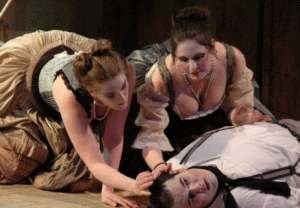
The noble highwayman
succored by his bawds.
Everybody knows what a parody is. My favorite is The
Beggar’s Opera, by John Gay, in which he laid funny lyrics
over tunes of the day, back in the Neoclassical Era of
English Literature, the precise dates of which I forever
remain fuzzy on. I didn’t feel like I missed much from not
knowing the originals of the tunes that Gay had written over
the melodies of, but probably there are a lot of extra
laughs to be harvested by getting those original lyrics and
doing a comparison. Probably someone’s done that by now and
it’s online, but I’m not going to search for it just right
now.
Because I’m on a mission to get a meaningful definition of
parody out of this session at the keyboard. And I’m not
going to just look it up and report what I find. I’m going
to think. Weird, huh?
See, when you think, sometimes you contradict yourself, and
you often seem to. I seem to have contradicted myself,
because my opening line says everyone knows what parody is,
and the opening line of the second paragraph says I’m
looking for a definition of parody. It only seems
contradictory, though. In the first paragraph, I gave you
an example with which you would automatically agree,
especially if you know The Beggars Opera. It is a perfect
example of the form, lacking nothing.
The parody presented by The Beggars Opera is deep and
multi-leveled. All of British society, notoriously
class-stratified, is defined as being of a piece, for as
Gay’s introductory character says, “It is difficult to
determine whether (in the fashionable vices) the fine
gentlemen imitate the gentlemen of the road, or the
gentlemen of the road the fine gentlemen.” Gay creates a
parody of high manners in low places, replacing the delicate
lyrics of popular English songs with the wisdom of whores
and highwaymen. The results are delicious. I enjoyed
reading it, hearing it in a recording, and most enjoyably,
in an incredible performance at McCabes in Santa Monica,
back in the early nineties. Took the whole family to get an
eyeful of a truly saucy production. My dad, who took me to
a few Broadway shows over the years, would have been proud.
The kids felt like they’d seen more than a spectacle. They
had glimpsed strange doings on that misty island towards
which they were sailing – adulthood.
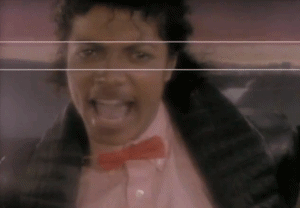
There are of course other very famous parodists, like Weird
Al Yankovic, who made himself on the back of Michael Jackson
and more power to him — the guy was funny. My favorite
parody of the Michael Jackson Billy
Jean video is one
Steve Martin did for
“The New Show,” a comedy vehicle that went nowhere, but had
a great first show. I was going to law school at that time,
poor as a churchmouse and always in need of cheap
entertainment for the kids.
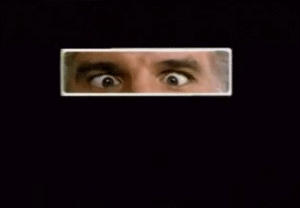
In those days, Michael Jackson was a god in LA, and that
Steve Martin parody of Billy Jean practically caused me to
die laughing. I noted it down as one of the most enjoyable
TV moments of my life.
Well, obviously, as I view it again today on the flatscreen,
context is everything when
you’re trying to get parodic punch. In order to enjoy the
parody to its full extent, you need to know the original.
Of course it shows how independently fine a librettist John
Gay was, that The Beggar’s Opera is wonderfully enjoyable
with no knowledge of the original songs whose tunes he
borrowed. This is not the fate of most parodists, whose
works, like clinging vines, require a strong tree to affix
themselves to.
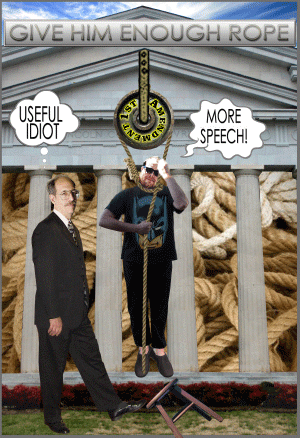
Too late now for a
reprieve — the light is in the sky and there is still no
parody at Charles-Carreon.com
Nowadays, there’s a lot of people claiming to be parodists
who wouldn’t know how to execute a parody if they were told
they would die at sunrise if they failed to do so. The
operator of Charles-Carreon.com is such a man. I can
imagine Popehat, in his cups, at the end of a long, boring
night in his glassed-in command post, looking over the
smoggy skyline towards San Bernardino, getting his jollies
sending Recouvreur a text telling him he’ll hang at dawn if
he can’t actually launch a real parody site against Carreon
before the first rays of sun tint the sky. Poor Christopher
would probably not be shocked to be told that he has fallen
far short of executing a real parody.
Christopher Recouvreur is not a parodist. He is a
fabulist. He makes things up about me. He imagines me
doing things, and imagines my wife doing things, and puts
words in the mouth of “Charles Carreon.” These words he
puts in my mouth are like nothing I have ever said or would
say. There’s no ironic play on my true character. He’s
pretending that Charles Carreon is a silly guy, that his
brain works in funny ways, and that everyone should make fun
of him. There’s no parody there.
I mean, I’ve done a few parodies, so I would recognize it if
someone actually parodied me. Like I took the “Hotel
California” tune and wrote anti-Bush lyrics for it in “Hotel
Babylonia.” I ripped off Elton John and did that “Condoleezza”
song about George W. Bush’s love for his Secretary of
State. I stole Elvis’ “Blue Suede Shoes” as the music for
my late-term craziness opus – “The
Old Ve-to,” and
clipped the Sex Pistols’ “God Save the Queen” for my
tour-de-force reconciliation of the opposites – “Vlad
and Me.” I’ve put funny
political lyrics in rock tunes lampooning conservative
politicians and policies – a harmless enjoyment that is
probably sufficient to get you some unwelcome attention.
Like from faux parodists like Recouvreur, a Rapeutationist
pretending to be an artist. Give you any odds that he did
not draw that cartoon of me on the dinosaur. (Can I buy it?)
If you were an artist, and you wanted to parody me, you
would have to actually look at what I have done, and start
making fun of that, which of course would be possible,
because everything can be made fun of, and I make the job
easier by engaging in outlier behavior, like leaving the big
city law grind, spending years living in yurts in the woods
of Southern Oregon, and having a well-known identification
with rock and rollers as heroes. C’mon, guys! There’s
stuff to work with here. I’m Mexican, and you can always
parody Mexicans easily, can’t you? Oh, I don’t fit the
stereotype! Damn! I’ve written smart-alecky songs like
“Explode on the Border,” with inflammatory lyrics like,
“I’ll show you what this burrito’s for!” Don’t be lazy.
You can use that.
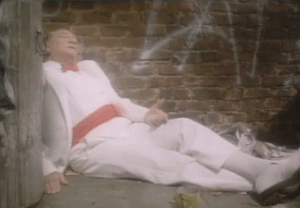
It’s almost like my enemies don’t really care. They put all
this time into researching me, and they don’t find anything
to parody me about. They just don’t see the material,
because they don’t have a creative bone in their body. All
they’re looking for is stuff that is easily recognizable as
“dirt,” bad things that Charles Carreon did or was
associated with. So they miss all the thousands of ways
that they could actually parody me. No surprise. They’re
not parodists, they’re just poo-flingin’ zombies on a
mission to paint the town brown. Since they can’t find much
dirt about me, they invent dirt with lies and damn lies,
expand the tiny amount of dirt that does exist, and make up
the difference with plain ole “Fuck that bastard!”
This entire post flies in the face of an old saying of mine:
“Never fault your enemies for ineptitude that accrues to
your benefit.” Think about it. With this information,
Popehat might be moved to fire Recouvreur and have someone
else parody me who would be much better at it. Then again,
a real parody of me would be funny, and probably much better
than simply being mocked by a jackass. C’est
la vie. Popehat’ll never do it. He’s just too cheap.
|